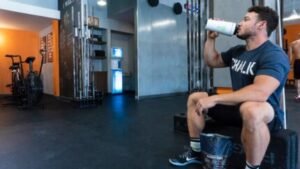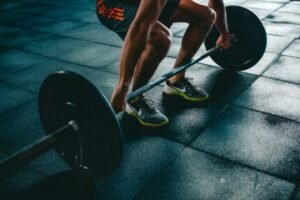Medically reviewed by Dr. Ramesh Gaddam, M.D. — Written by Sumalatha, D.N.H.E
Figuring out how much protein you need to build muscle can be confusing, making it hard to get the results you want from your workouts. Learning about your protein needs based on your goals and activity level can help you build muscle more effectively. Studies show that getting enough protein helps your muscles grow stronger and perform better during exercise.
1) Importance of protein in muscle building
Protein is often hailed as the cornerstone of muscle building, and for good reason.
It plays a vital role in repairing and building muscle tissue, making it essential for anyone looking to increase muscle mass, strength, and overall athletic performance.

Muscle Repair and Growth
When you engage in physical activity, especially resistance training, you create micro-tears in your muscle fibers.
Protein provides the necessary building blocks (amino acids) for repairing and rebuilding these damaged tissues, leading to muscle growth and adaptation over time.
Increased Muscle Protein Synthesis
Protein consumption stimulates muscle protein synthesis, the process by which your body builds new proteins to repair and grow muscle tissue.
Higher levels of muscle protein synthesis lead to greater gains in muscle mass and strength.
Satiety and Weight Management
Protein is also known for its satiating effect, meaning it helps you feel fuller for longer.
This can be advantageous for those looking to manage their weight while building muscle, as it can aid in controlling appetite and reducing overall calorie intake.
Preservation of Lean Muscle Mass
During periods of calorie restriction or weight loss, adequate protein intake becomes even more crucial.
It helps preserve lean muscle mass, ensuring that the weight lost comes primarily from fat stores rather than muscle tissue.
2) Misconceptions about Protein Intake
While protein is undeniably important for muscle building, there are several misconceptions surrounding its intake that need to be addressed.

More Protein Equals More Muscle
While protein is necessary for muscle growth, consuming excessive amounts won’t necessarily result in faster gains.
The body has a limit to how much protein it can use for muscle building at one time, and any excess is either burned for energy or stored as fat.
Protein Timing is Everything
While consuming protein around workouts can be beneficial for muscle repair and growth, the importance of precise timing is often exaggerated.
The total amount of protein consumed throughout the day is more important than when it is consumed.
Plant-Based Proteins are Inferior
There’s a common misconception that plant-based proteins are inferior to animal-based proteins for muscle building.
However, many plant sources, such as lentils, beans, tofu, and quinoa, provide complete protein profiles and can be just as effective when combined properly in the diet.
Protein Supplements are a Must
While protein supplements like powders and bars can be convenient for meeting protein needs, they are not essential for muscle building.
Whole food sources like meat, fish, dairy, eggs, legumes, and grains can provide more than enough protein for most individuals.
3) Role of Protein in Muscle Repair and Growth
Protein is the key nutrient responsible for muscle repair and growth. When you engage in activities like weightlifting or resistance training, you create micro-tears in your muscle fibers.

Protein provides the necessary amino acids to repair these tears and build new muscle tissue, leading to increased muscle size and strength over time.
Repairing Micro-Tears
During exercise, especially high-intensity activities, muscle fibers undergo stress and damage.
Protein serves as the building blocks needed to repair these micro-tears, allowing muscles to grow stronger and more resilient with each repair cycle.
Building Muscle Tissue
In addition to repair, protein also supports the synthesis of new muscle tissue.
Muscle growth occurs when the rate of muscle protein synthesis exceeds the rate of breakdown.
Adequate protein intake ensures that there are enough amino acids available for this process, facilitating muscle growth.
Recovery
Protein is crucial for post-workout recovery.
Consuming protein after exercise helps replenish glycogen stores, reduces muscle soreness, and initiates the repair and growth processes, setting the stage for the next workout.
4) Protein Synthesis and Muscle Hypertrophy
Muscle hypertrophy, or the increase in muscle size, is directly related to protein synthesis. Protein synthesis is the process by which cells build new proteins, including those needed for muscle repair and growth.

Several key points about protein synthesis and muscle hypertrophy include:
Stimulation
Resistance training stimulates muscle protein synthesis.
The stress placed on the muscles during exercise triggers signaling pathways that activate protein synthesis, leading to muscle repair and growth.
Timing
While protein synthesis is elevated immediately following exercise, it remains elevated for up to 24-48 hours, depending on factors such as the intensity and volume of the workout.
Consuming protein within this post-exercise window can maximize muscle protein synthesis and enhance muscle recovery and growth.
Muscle Hypertrophy
Muscle hypertrophy occurs when the rate of muscle protein synthesis exceeds the rate of muscle protein breakdown over time.
This process is influenced not only by protein intake but also by other factors such as training intensity, volume, frequency, and overall nutrition.
5) Factors Influencing Protein Requirements
Several factors influence an individual’s protein requirements for muscle growth:

Body Weight and Composition
Those with more muscle mass generally require more protein to support muscle repair and growth compared to individuals with less muscle mass.
Activity Level
Athletes and those engaging in regular resistance training require more protein to support muscle recovery and adaptation compared to sedentary individuals.
Training Intensity and Volume
Higher-intensity and volume workouts result in greater muscle damage and therefore require more protein for repair and growth.
Age
Older adults may have higher protein requirements to offset age-related muscle loss and maintain muscle mass and function.
Quality of Protein
The quality of protein sources matters. Complete proteins containing all essential amino acids, such as animal proteins, are typically more effective for muscle building than incomplete plant-based proteins.
6) Recommended Protein Intake for Muscle Building

General Guidelines from Reputable Sources
Various reputable organizations provide guidelines for protein intake, including the World Health Organization (WHO) and the American College of Sports Medicine (ACSM):
World Health Organization (WHO)
WHO recommends a minimum protein intake of 0.8 grams per kilogram of body weight per day for adults to prevent malnutrition.
However, for individuals looking to build muscle, higher protein intake may be necessary.
American College of Sports Medicine (ACSM)
ACSM suggests that individuals engaged in regular resistance training or other forms of intense exercise may benefit from higher protein intake.
Their recommendations typically range from 1.2 to 2.0 grams of protein per kilogram of body weight per day for athletes and active individuals.
7) Protein Intake Based on Activity Level and Body Weight

Sedentary Individuals
Sedentary individuals may require around 0.8 grams of protein per kilogram of body weight per day to meet basic needs.
Recreational Exercisers
Those engaging in moderate exercise or recreational activities may aim for 1.2 to 1.4 grams of protein per kilogram of body weight per day.
Endurance Athletes
Endurance athletes may require slightly higher protein intake, around 1.2 to 1.6 grams per kilogram of body weight per day, to support muscle repair and recovery from training.
Strength and Power Athletes
Individuals involved in strength training or power sports may benefit from even higher protein intake, ranging from 1.6 to 2.0 grams per kilogram of body weight per day.
8) Timing and Distribution

Pre-Workout
Consuming a protein-rich meal or snack 1-2 hours before a workout can provide amino acids for muscle repair and energy during exercise.
Post-Workout
Consuming protein within 30 minutes to 2 hours after exercise is crucial for maximizing muscle protein synthesis and promoting muscle recovery.
A protein source with fast-digesting proteins, such as whey protein, can be ideal for post-workout consumption.
Throughout the Day
Distributing protein intake evenly throughout the day, including at each meal and snack, can help maintain a consistent supply of amino acids for muscle repair and growth.
Bedtime
Consuming a protein-rich snack before bedtime, such as Greek yogurt or cottage cheese, may support overnight muscle repair and growth.
9) Protein Needs

Training Intensity
The intensity of exercise directly affects protein needs.
Higher-intensity workouts, such as heavy resistance training or high-intensity interval training (HIIT), cause more muscle damage and require higher protein intake for repair and growth.
Training Duration
Longer training sessions, especially endurance activities lasting more than an hour, can also increase protein requirements.
During prolonged exercise, the body may start breaking down muscle tissue for energy, making adequate protein intake crucial for preserving muscle mass.
10. Considerations for Different Types of Athletes

Endurance Athletes
Endurance athletes, such as runners, cyclists, and swimmers, have increased energy and protein needs due to the sustained nature of their activities.
While carbohydrates are primary for fueling endurance exercise, protein is essential for repairing muscle damage and promoting recovery.
Endurance athletes may benefit from a protein intake ranging from 1.2 to 1.6 grams per kilogram of body weight per day.
Strength and Power Athletes
Strength and power athletes, including weightlifters, bodybuilders, and sprinters, have higher protein requirements to support muscle repair, growth, and strength gains.
Protein intake for these athletes may range from 1.6 to 2.0 grams per kilogram of body weight per day, or even higher during intense training phases.
Combination Athletes
Some athletes engage in both endurance and strength training, such as triathletes or team sport athletes.
These individuals may require protein intake within the higher range to accommodate the demands of both types of exercise.
11. Impact of Age, Gender, and Metabolism

Age
Older adults may have higher protein requirements to offset age-related muscle loss and maintain muscle mass and function.
The elderly may benefit from higher protein intake (around 1.2 to 1.6 grams per kilogram of body weight per day) to support muscle health and mobility.
Gender
Gender can also influence protein needs, with men generally having higher muscle mass and therefore requiring more protein than women.
However, individual differences in body composition and activity level should be considered when determining protein intake.
Metabolism
Differences in metabolic rate can affect protein requirements.
Those with faster metabolisms may need slightly more protein to support energy expenditure and muscle repair.
12. Monitoring Muscle Growth and Performance

Muscle Growth
Regularly assessing muscle growth through measurements such as body composition analysis (e.g., muscle mass, body fat percentage) or progress photos can help determine if protein intake is adequate.
Increased muscle size and strength over time indicate that protein intake is supporting muscle growth effectively.
Performance
Monitoring performance in workouts and sports activities is crucial.
Improved strength, power, endurance, and overall athletic performance can indicate that protein intake is sufficient to support training goals.
13. Signs of Inadequate Protein Intake

Lack of Muscle Growth
If muscle growth stalls or progress is slow despite consistent training, inadequate protein intake could be a contributing factor.
Fatigue and Poor Recovery
Feeling excessively fatigued, experiencing prolonged muscle soreness, or having difficulty recovering between workouts may indicate insufficient protein intake to support muscle repair and recovery.
Increased Injury Risk
Inadequate protein intake can weaken muscles and connective tissues, increasing the risk of injuries during training or sports activities.
Decreased Immune Function
Protein is essential for maintaining a healthy immune system. Frequent illness or prolonged recovery from illnesses may suggest inadequate protein intake.
14. Adjustments to Protein Intake

Increased Training Intensity or Volume
If training intensity or volume increases, such as adding more sessions per week or increasing the duration and intensity of workouts, protein needs may also increase to support muscle repair and recovery.
Plateaus in Muscle Growth or Performance
If progress stalls despite consistent training, gradually increasing protein intake within recommended ranges can help stimulate further muscle growth and improve performance.
Recovery from Injuries
During periods of injury recovery, protein needs may increase to support tissue repair.
Adjusting protein intake upwards temporarily can aid in the healing process.
Periodization
Some athletes utilize periodization, where training volume and intensity fluctuate over time.
Adjusting protein intake to match the demands of each training phase can optimize muscle adaptation and recovery.
15. Common Myths and Misconceptions

More Protein Equals More Muscle
Myth:
The belief that consuming excessive amounts of protein will result in faster muscle growth.
Reality:
While protein is essential for muscle building, consuming more than the body needs won’t necessarily lead to more muscle mass.
The body has a limit to how much protein it can utilize for muscle synthesis at one time.
Any excess protein is either used for energy or stored as fat.
Consuming protein within recommended ranges (1.6 to 2.0 grams per kilogram of body weight per day for strength athletes) is sufficient to support muscle growth, and consuming excessively high amounts won’t provide additional benefits.
Timing of Protein Intake is the Most Critical Factor
Myth:
The belief that consuming protein immediately before or after a workout is crucial for maximizing muscle growth.
Reality:
While there is some benefit to consuming protein around the time of exercise to support muscle repair and recovery, the timing of protein intake is not as critical as once believed.
The body’s ability to utilize protein for muscle synthesis persists for several hours after exercise.
As long as daily protein needs are met, including protein in meals and snacks throughout the day, timing becomes less important.
What matters most is meeting total daily protein requirements rather than focusing solely on peri-workout nutrition.
Protein from Plant-Based Sources is Inferior for Muscle Building
Myth:
The belief that animal-based proteins are superior to plant-based proteins for building muscle.
Reality:
While animal-based proteins are considered “complete” proteins because they contain all essential amino acids in the right proportions, many plant-based proteins can also provide a complete amino acid profile.
Legumes, tofu, tempeh, quinoa, and soy products are examples of plant-based proteins that offer all essential amino acids.
With proper food combinations, individuals can meet their protein needs and support muscle growth with a plant-based diet.
What’s more, plant-based sources often come with additional health benefits like fiber, vitamins, and minerals, making them a valuable part of a balanced diet.
FAQs About Protein and Muscle Building
Can you consume too much protein?
Yes, it is possible to consume too much protein. While protein is essential for muscle building and overall health, excessive intake can lead to various issues:
Kidney Strain
Consuming very high amounts of protein can put strain on the kidneys, particularly in individuals with pre-existing kidney conditions.
Dehydration
High protein intake can increase the body’s need for water, potentially leading to dehydration if adequate fluid intake is not maintained.
Weight Gain
Excess protein, like any macronutrient, can contribute to weight gain if consumed in excess of calorie needs, as it provides calories.
Nutrient Imbalances
Focusing excessively on protein consumption may lead to neglecting other important nutrients found in a balanced diet, such as carbohydrates, fats, vitamins, and minerals.
Medically reviewed by Dr. Ramesh Gaddam, M.D.

General Physician, Diabetologist, and Critical Care Specialist.
Discover more from Health Build-Up
Subscribe to get the latest posts sent to your email.
